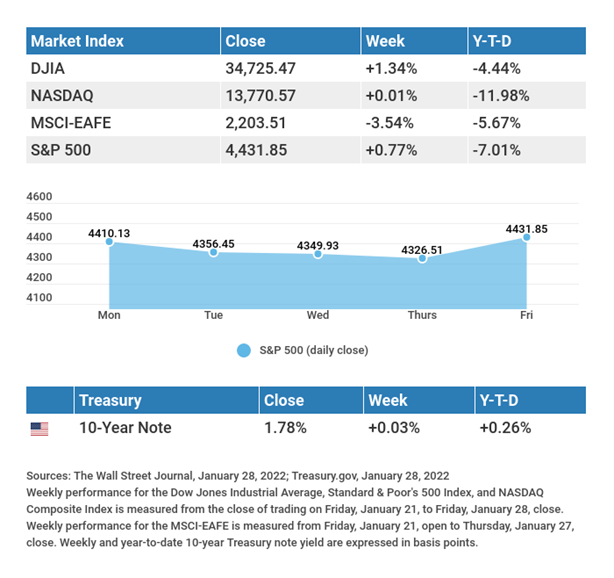In this week’s recap: Volatile week ends on a rebound.
Weekly Economic Update
THE WEEK ON WALL STREET
An exceptionally volatile week, marked by wide intraday price swings, whipsawed investors with stocks ending higher following a surge to the upside on the final trading day of the week.
The Dow Jones Industrial Average rose 1.34%, while the Standard & Poor’s 500 gained 0.77%. The Nasdaq Composite index ended flat (+0.01%) for the week. The MSCI EAFE index, which tracks developed overseas stock markets, declined 3.54%.1,2,3
MARKET VOLATILITY
Rising bond yields, Federal Reserve uncertainty, and escalating tensions on the Ukrainian-Russian border unsettled markets all week. The week opened with two successive days of deep early losses that were erased by furious, late-afternoon rebounds. The following two-trading sessions that started with strong gains that evaporated with late-session selling.
The most dramatic session was Monday, in which stocks ended slightly higher after hitting intraday lows that saw the NASDAQ fall 4.9%, the Dow shed 1,115 points, and the S&P 500 moved into correction territory. Technology was at the epicenter of the volatility all week as rate fears weighed on sector. Stocks rebounded strongly on Friday, managing to conclude a week on an upbeat note.4
FED READIES MARKET FOR RATE HIKES
Last week’s meeting of the Federal Open Market Committee (FOMC) left rates unchanged, though officials signaled short-term rates would likely be raised at its next meeting in March. As expected, the Fed also approved one last round of bond purchases, bringing quantitative easing to an end by March.5
Left a bit more nebulous were details on the pace and timing of reducing the Fed’s balance sheet, a lingering worry of some investors. But Fed Chair Powell indicated that shrinking the Fed’s asset holdings may occur at a faster rate than in past periods of balance-sheet reductions, such as in 2014 and 2017.6
 THE WEEK AHEAD: KEY ECONOMIC DATA
THE WEEK AHEAD: KEY ECONOMIC DATA
- Tuesday: ISM (Institute for Supply Management) Manufacturing Index. JOLTS (Job Openings and Labor Turnover Survey).
- Wednesday: ADP (Automated Data Processing) Employment Report.
- Thursday: Factory Orders. Jobless Claims. ISM (Institute for Supply Management) Services Index.
- Friday: Employment Situation.
Source: Econoday, January 28, 2022
The Econoday economic calendar lists upcoming U.S. economic data releases (including key economic indicators), Federal Reserve policy meetings, and speaking engagements of Federal Reserve officials. The content is developed from sources believed to be providing accurate information. The forecasts or forward-looking statements are based on assumptions and may not materialize. The forecasts also are subject to revision.
THE WEEK AHEAD: COMPANIES REPORTING EARNINGS
- Tuesday: Alphabet, Inc.(GOOGL), Advanced Micro Devices, Inc. (AMD), Exxon Mobil Corporation (XOM), PayPal Holdings, Inc. (PYPL), General Motors Company (GM), Gilead Sciences, Inc. (GILD), Starbucks Corporation (SBUX), United Parcel Service, Inc. (UPS), Stanley Black & Decker, Inc. (SWK).
- Wednesday: Meta Platforms, Inc. (FB), AbbVie, Inc. (ABBV), Qualcomm, Inc. (QCOM), Thermo Fisher Scientific, Inc. (TMO), Spotify Technology (SPOT), TMobile US, Inc. (TMUS), D.R. Horton, Inc. (DHI).
- Thursday: Amazon.com, Inc. (AMZN), Ford Motor Company (F), Snap, Inc. (SNAP), Eli Lilly and Company (LLY), Fortinet, Inc. (FTNT), Skyworks Solutions, Inc. (SWKS), Honeywell International, Inc. (HON), Prudential Financial, Inc. (PRU).
- Friday: Air Products and Chemicals, Inc. (APD), Bristol Myers Squibb Company (BMY).
Source: Zacks, January 28, 2022
Companies mentioned are for informational purposes only. It should not be considered a solicitation for the purchase or sale of the securities. Investing involves risks, and investment decisions should be based on your own goals, time horizon, and tolerance for risk. The return and principal value of investments will fluctuate as market conditions change. When sold, investments may be worth more or less than their original cost. Companies may reschedule when they report earnings without notice.
Scarlet Oak Financial Services can be reached at 800.871.1219 or contact us here.
Source
Investing involves risks, and investment decisions should be based on your own goals, time horizon, and tolerance for risk. The return and principal value of investments will fluctuate as market conditions change. When sold, investments may be worth more or less than their original cost.
The forecasts or forward-looking statements are based on assumptions, may not materialize, and are subject to revision without notice.
The market indexes discussed are unmanaged, and generally, considered representative of their respective markets. Index performance is not indicative of the past performance of a particular investment. Indexes do not incur management fees, costs, and expenses. Individuals cannot directly invest in unmanaged indexes. Past performance does not guarantee future results.
The Dow Jones Industrial Average is an unmanaged index that is generally considered representative of large-capitalization companies on the U.S. stock market. Nasdaq Composite is an index of the common stocks and similar securities listed on the NASDAQ stock market and is considered a broad indicator of the performance of technology and growth companies. The MSCI EAFE Index was created by Morgan Stanley Capital International (MSCI) and serves as a benchmark of the performance of major international equity markets, as represented by 21 major MSCI indexes from Europe, Australia, and Southeast Asia. The S&P 500 Composite Index is an unmanaged group of securities that are considered to be representative of the stock market in general.
U.S. Treasury Notes are guaranteed by the federal government as to the timely payment of principal and interest. However, if you sell a Treasury Note prior to maturity, it may be worth more or less than the original price paid. Fixed income investments are subject to various risks including changes in interest rates, credit quality, inflation risk, market valuations, prepayments, corporate events, tax ramifications and other factors.
International investments carry additional risks, which include differences in financial reporting standards, currency exchange rates, political risks unique to a specific country, foreign taxes and regulations, and the potential for illiquid markets. These factors may result in greater share price volatility.
Please consult your financial professional for additional information.
This content is developed from sources believed to be providing accurate information. The information in this material is not intended as tax or legal advice. Please consult legal or tax professionals for specific information regarding your individual situation. This material was developed and produced by FMG Suite to provide information on a topic that may be of interest. FMG is not affiliated with the named representative, financial professional, Registered Investment Advisor, Broker-Dealer, nor state- or SEC-registered investment advisory firm. The opinions expressed and material provided are for general information, and they should not be considered a solicitation for the purchase or sale of any security.
Copyright 2022 FMG Suite.
CITATIONS:
- The Wall Street Journal, January 28, 2022
- The Wall Street Journal, January 28, 2022
- The Wall Street Journal, January 28, 2022
- CNBC, January 24, 2022
- The Wall Street Journal, January 26, 2022
- The Wall Street Journal, January 26, 2022



